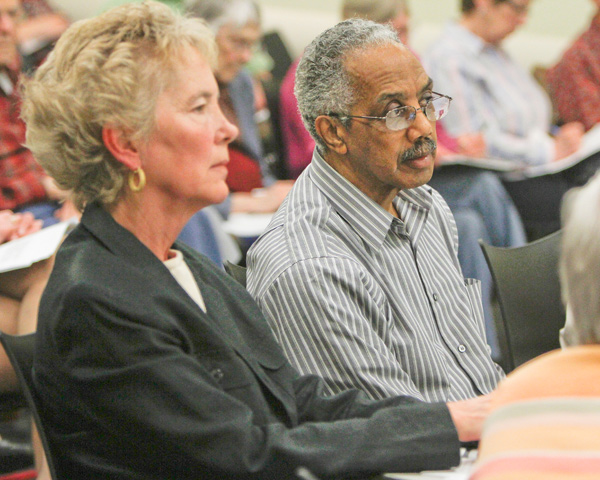Fill open records requests ASAP, AG official says


Maggy Lorenzi of Youngstown, a community activist, and Richard Atkinson, president of the Youngstown school board, were among those attending a session Monday on open-records and open-meetings laws.
YOUNGSTOWN
A state attorney general office official advises local government to “go above and beyond” when it comes to honoring legitimate open-records requests.
That means filling the request as soon as possible, working with those seeking the information, and it’s not a bad idea to forgo charging a fee to those making the inquiries to create good will, said Jeff Clark, principal assistant attorney general.
Clark spoke Monday to about 60 to 70 government officials and community activists at a three-plus-hour training session at the Newport Branch of the Public Library of Youngstown and Mahoning County on the city’s South Side.
Nearly all of the session focused on open records with about 10 minutes at the end discussing open meetings.
“It can be very confusing when you get a request” for public records, said Youngstown Councilwoman Annie Gillam, D-1st, who attended Monday’s session. “It can get complicated. It’s always good to hear it for yourself.”
The state Legislature has changed Sunshine Laws — those dealing with open records and open meetings — over the years, and there have been court decisions resulting in other changes, so it’s important for public officials to understand the law, Clark said.
“The law is changed at least once a year,” he said.
The state Legislature approved a bill in 2007 that required all elected officials in Ohio or their designees to attend a training session at least once during their time in office. Monday’s free session was open to them and to the public.
Richard Atkinson, Youngstown school board president, said the meeting made him interested in the district’s record-retention policy about how long it must maintain public documents.
Maggy Lorenzi, a community activist who sat next to Atkinson at Monday’s meeting, said she came to the session “just for clarification. I’ve read the [Sunshine Law] book 1 million times.”
Lorenzi asked Clark about Youngstown’s lack of a records-retention policy — something that state audits have recommended the city create for several years.
Records-retention commissions are required by law, Clark said, to meet at least once a year. Lorenzi said the commission doesn’t exist and hasn’t met.
Clark advised government entities to cooperate with the public when it comes to legitimate record requests as it’s easier to comply than fight; a lawsuit can be expensive; and under state law, a person can file a civil action to recover $1,000 for each violation from a public entity with a $10,000 cap.
He also warned public entities not to make any decisions in executive session or to take informal votes.
 43
43
